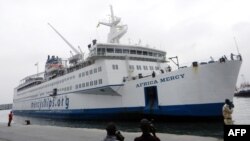The world’s largest non-government hospital ship is docked in Cameroon’s commercial capital, Douala, where local health care gaps remain enormous.
Medical staff and volunteers from around the world plan to provide nearly 3,000 free surgeries aboard the Africa Mercy over the next 10 months.
Bernadette Aboudjio traveled 600 kilometers from eastern Cameroon with her two children who suffer from club foot.
She said she brought them here because she has been told that they will get free operations. She said she is very grateful because she does not have the money to take the children to the hospital.
Club foot is just one of many ailments for which little surgical treatment is available in Cameroon.
The Ministry of Health reports that the country has just 4,200 medical doctors for a population of 23 million, and only about half are practicing.
One ambulance recently rushed to the Yaounde general hospital last month to find hundreds of patients suffering from kidney defects blocking the hospital entrance. They said they had not received treatment for two months. Their leader, Aloise Ovidi, said almost all equipment was broken.
He said the government has not been fulfilling its promises even though it is aware 32 people living with kidney defects had died in less than two months.
He said others can no longer walk because only eight of the 17 dialysis machines at the general hospital in Yaounde are functioning. He said instead of the four hours of treatment, patients are receiving just three.
Outside the two main cities of Yaounde and Douala, quality medical care is even harder to find. The Ministry of Health says the majority of the population relies instead of traditional healers.
Cameroon’s health minister, Andre Mama Fouda, told VOA only seven percent of the national budget is allocated for health care.
He said raising that allocation to 15 percent would enable the country to develop the health sector, including infrastructure and surgical equipment. He said many more people should have access to health care but unfortunately the country has many other development priorities and only limited resources.
Back in the waters off Douala, flags fly on the Africa Mercy, the gigantic white vessel housing Mercy Ships' mobile hospital. The flags represent some of the 40 nationalities of the medical staff and volunteers on board.
Warie Blackburn is the managing director of Mercy Ships. The U.S.-based charity has operated hospital ships in developing nations since 1978.
“About 3,000 people from Cameroon we are hoping to help surgically. In addition, we are also planning to help with the training of the doctors, the nurses and other health professionals," said Blackburn.
She said they have selected the patients on the basis of need, focusing on surgeries that cannot be performed in local hospitals for lack of equipment and qualified staff. Such surgeries include tumor removal and repair of hernias, obstetric fistulas, cleft palates and cataracts.
The government of Cameroon is providing transportation, lodging and food for patients and their families while they receive care.
Mercy Ships hopes to train 1,000 local health care workers to do follow up care and help other patients before the ship raises anchor in June 2018.




